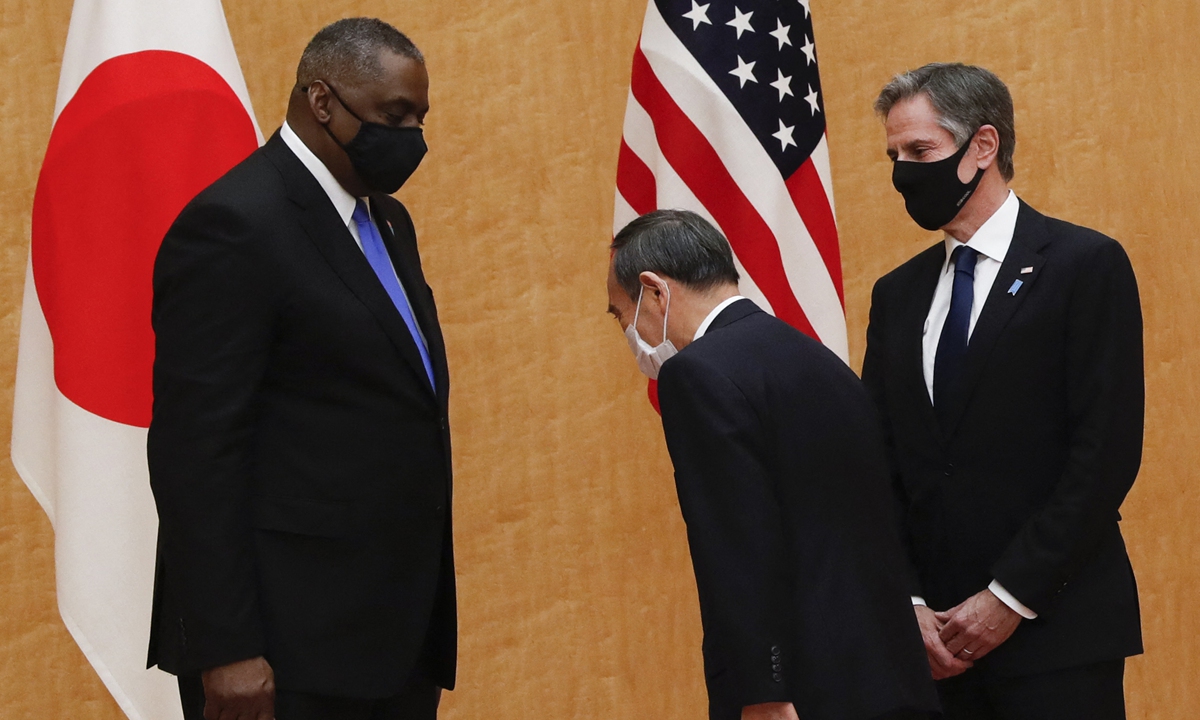
Japanese Prime Minister Yoshihide Suga greeted US Secretary of State Antony Blinken and US Defense Secretary Lloyd Austin. Photo: AFP
The fierce, tit-for-tat opening of the strategic dialogue between China and the US in Alaska on Thursday local time has caught the attention of the world. Many netizens, both Chinese and foreign, have applauded the sharp counterattack made by the Chinese delegation in response to the US side's arrogance at the meeting.
In the comments section under the relevant news section of Yahoo News Japan, where anti-China sentiment usually runs high, one comment receiving many likes stated: "I wish Japan could express its diplomatic views directly as China did." Japanese netizens called their country not to engage in "coward diplomacy" anymore when it deals with the US. They said Japan will not win international trust or respect, nor further its national interests by being soft-spoken.
The Chinese side's performance at the Alaska meetings actually represents what the Japanese public wants their diplomats to behave like when dealing with Japan-US relations. Relations between the US and Japan have remained essentially unchanged since the Security Treaty between Japan and the US was signed in 1951.
The power structure whereby the US is still powerful and Japan is relatively weak has not changed. But judging from the opinions expressed by Japanese netizens, the Japanese public opinion has become more and more dissatisfied with US' arrogance. They resent Japan's obedience to the US.
US Secretary of State Antony Blinken and Secretary of Defense Lloyd Austin traveled to Asia last week in an attempt to rally allies and partners against China. Joint statements made by the US and South Korea and India didn't mention China. But one with Japan claimed China presents political, economic, military, and technological challenges, and attacked China over issues concerning the South China Sea and the Diaoyu Islands issues.
This indicates Japan's strong desire to make the US back it up with China-related affairs—especially the maritime imbroglios. Conflict in the regard has escalated following China's Coast Guard Law, which came into effect on February 1. Japan mistakenly believes that the law is targeting Japan. This has fueled Tokyo's urgency to seek help and commitment from the US for protection. Yet Japan may not want to become the front line of the US' anti-China alliance in East Asia. But it is worth noting that the US Indo-Pacific Strategy may inadvertently push Tokyo forward into the so-called "point" position.
Japan moving closer with the US to confront China will have an all-round influence on China-Japan relations. Although till now, it hasn't thwarted the continuing cooperation between China and Japan, it's fair to say that China-Japan relations are seeing a retreat, and returning to what they used to be during the early stages of the Abe administration.
If all of Japan's strategies are made in lockstep with the US, then it will have less maneuvering room in East Asia. Japan must distinguish itself from the US in terms of policies. And it must have the guts to say no to Washington. Only this way can it win the trust and respect of neighboring countries.
Some observers believe China and US being locked in a strategic competition may be more beneficial to Japan, since Japan can play a bigger role maintaining a balance between the two countries. However, with the dramatic changes in the East Asian and Asia-Pacific orders, the rise of China's national strength contrasts sharply with Japan's decline. Indeed, Japan is becoming less influential. Tokyo is facing increasing difficulties striking a delicate balance between Beijing and Washington.
At present, there is still some leeway in Japan's policy toward China. And vice versa. This means that there is some room for the two countries to have a dialogue on several issues, including the Chinese leader's visit to Japan, the holding of the Olympic Games. Concerning the latter, the two can hopefully address how the summer Olympics in Tokyo will be carried out amidst the pandemic. What China needs to do is to make "the barrel as big as possible." The short board of the barrel will always be there. But if the barrel can be made bigger, then maybe China can store more water in it, as the proverb goes.
The author is an associate research fellow at the Center for Japanese Studies, Fudan University. opinion@globaltimes.com.cn




